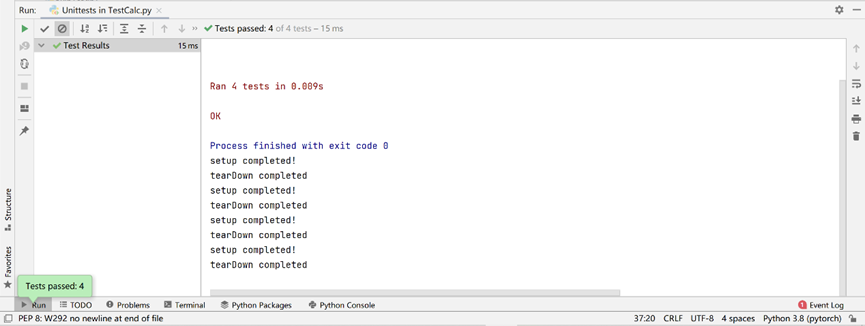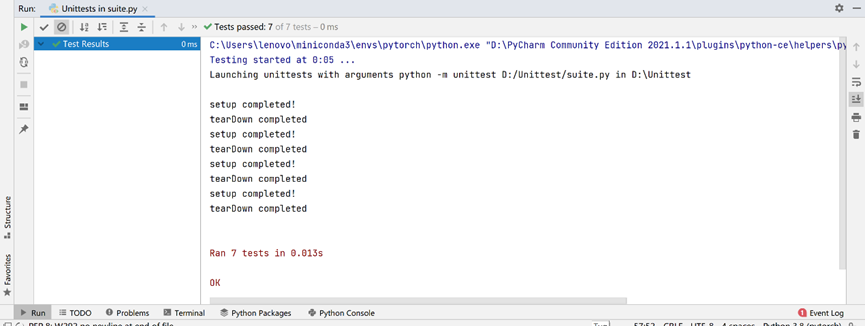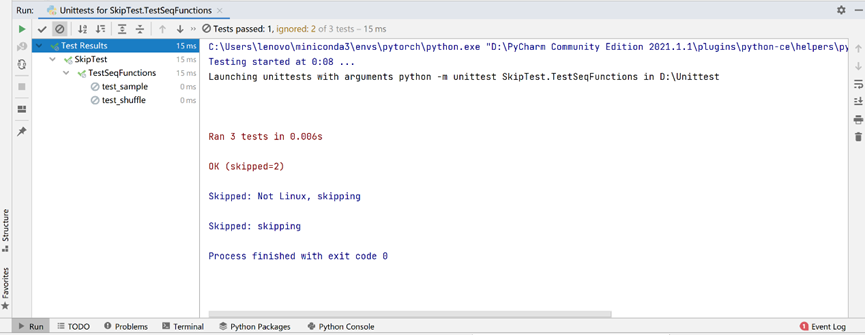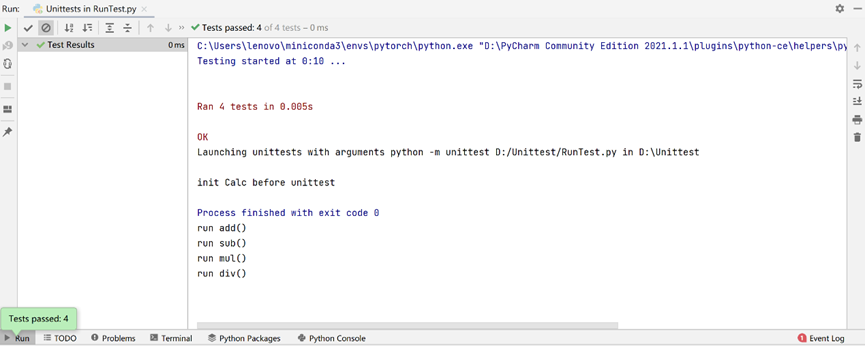For today’s experiment , I chose the topic which is related to python.
1. unittest assert test
- import unittest, random
-
- # Test Class
- class MyClass(object):
-
- @classmethod
- def sum(self, a, b):
- return a + b
-
- @classmethod
- def div(self, a, b):
- return a / b
-
- @classmethod
- def retrun_None(self):
- return None
-
-
- # Unit Test Class
- class MyTest(unittest.TestCase):
- # assertEqual()
- def test_assertEqual(self):
- # test if a+b equals sum or not
- try:
- a, b = 1, 2
- sum = 3
- self.assertEqual(a + b, sum, 'assert failed!,%s + %s != %s' % (a, b, sum))
- except AssertionError as e:
- print(e)
-
- # assertNotEqual()
- def test_assertNotEqual(self):
- # fix missing three lines of codes below ‘try’, test if b-a equals res or not
- try:
- a, b = 1, 2
- res = 0
- self.assertNotEqual((b - a), (res), 'assert failed!,%s - %s != %s' % (b, a, res))
- except AssertionError as e:
- print(e)
-
- # assertTrue()
- def test_assertTrue(self):
- try:
- self.assertTrue(1 == 1, "False expression")
- except AssertionError as e:
- print(e)
-
- # assertFalse()
- def test_assertFalse(self):
- # fix missing codes below ‘try’, only a line of codes needed
- try:
- self.assertFalse(1 != 1, "False expression")
- except AssertionError as e:
- print(e)
-
- # assertIs()
- def test_assertIs(self):
- # test a and b are totally same
- try:
- a = 12
- b = a
- self.assertIs(a, b, "%s and %s are not same" % (a, b))
- except AssertionError as e:
- print(e)
-
- # assertIsInstance()
- def test_assertIsInstance(self):
- # fix missing codes below ‘y=object’ to test type(x) != y, only a line of codes needed
- try:
- x = MyClass
- y = object
- self.assertIsInstance(type(x), y, "Not an Instance")
- except AssertionError as e:
- print(e)
-
- if __name__ == '__main__':
- # run unittest
- unittest.main()

2.unittest test groups
Calc.py
- class Calc(object):
-
- def add(self, *d):
- #
- result = 0
- for i in d:
- result += i
- return result
-
- def mul(self, *d):
- #
- result = 1
- for i in d:
- result = result * i
- return result
-
-
- def sub(self, a, *d):
- #
- result = a
- for i in d:
- result = result - i
- return result
-
-
- def div(self, a, *d):
- #
- result = a
- for i in d:
- result = result / i
- return result
TestCalc.py
- import unittest
- import random
- from Calc import Calc
-
- class TestCalcFunctions(unittest.TestCase):
-
- def setUp(self):
- self.c = Calc()
- print("setup completed!")
-
- def test_sum(self):
- self.assertTrue(self.c.add(1, 2, 3, 4) == 10)
-
- def test_sub(self):
- # fix a line of codes to test c.sub(self, a, *b) method
- self.assertTrue(self.c.sub(4, 1, 2, 3) == -2)
- def test_mul(self):
- # fix a line of codes to test c.mul(self, *b) method
- self.assertTrue(self.c.mul(3, 4) == 12)
- def test_div(self):
- # fix a line of codes to test c.div(self, a, *b) method
- self.assertTrue(self.c.div(4, 2) == 2)
- def tearDown(self):
- print("test completed!")
-
- def tearDown(self):
- print("tearDown completed")
-
- if __name__ == '__main__':
- unittest.main()

unittest_suite.py
- import random
- import unittest
- from TestCalc import TestCalcFunctions
-
-
- class TestSequenceFunctions(unittest.TestCase):
- def setUp(self):
- self.seq = list(range(10))
-
- def tearDown(self):
- pass
-
- def test_choice(self):
- # chose an element from seq randomly
- element = random.choice(self.seq)
- # check element is truly in the sequence
- self.assertTrue(element in self.seq)
-
- def test_sample(self):
- # if codes raise exception
- with self.assertRaises(ValueError):
- random.sample(self.seq, 20)
-
- for element in random.sample(self.seq, 5):
- self.assertTrue(element in self.seq)
-
-
- class TestDictValueFormatFunctions(unittest.TestCase):
- def setUp(self):
- self.seq = list(range(10))
-
- def tearDown(self):
- pass
-
- def test_shuffle(self):
- # shuffle sequence
- random.shuffle(self.seq)
- self.seq.sort()
- self.assertEqual(self.seq, list(range(10)))
- # check TypeError exception
- self.assertRaises(TypeError, random.shuffle, (1, 2, 3))
-
-
- if __name__ == '__main__':
- # get all test methods start with ‘test’ and return a suite
- suite1 = unittest.TestLoader().loadTestsFromTestCase(TestSequenceFunctions)
- # please fix another two suite, suite2 of TestCalcFunctions and suite3 of TestDictValueFormatFunctions
- suite2 = unittest.TestLoader().loadTestsFromTestCase(TestCalcFunctions)
- # put more test class into suite
- suite3 = unittest.TestLoader().loadTestsFromTestCase(TestDictValueFormatFunctions)
- # you can change suites’ order, like [suite1, suite2, suite3]
- suite = unittest.TestSuite([suite2, suite1, suite3])
- # set verbosity = 2 you could get more detailed information
- unittest.TextTestRunner(verbosity=2).run(suite)

3. unittest skip test
- # encoding=utf-8
-
- import random, sys, unittest
-
-
- class TestSeqFunctions(unittest.TestCase):
- a = 1
-
- def setUp(self):
- self.seq = list(range(20))
-
- @unittest.skip("skipping") # skip this method anyway
- def test_shuffle(self):
- random.shuffle(self.seq)
- self.seq.sort()
- self.assertEqual(self.seq, list(range(20)))
- self.assertRaises(TypeError, random.shuffle, (1, 2, 3))
-
- # add a line of annotation that skip this method if a>5
- @unittest.skipIf(a > 5,"skip this method if a>5")
- def test_choice(self):
- element = random.choice(self.seq)
- self.assertTrue(element in self.seq)
-
- # add a line of annotation that skip if not in linux platform
- @unittest.skipIf(sys.platform!='linux', "Require for linux")
- def test_sample(self):
- with self.assertRaises(ValueError):
- random.sample(self.seq, 20)
- for element in random.sample(self.seq, 5):
- self.assertTrue(element in self.seq)
-
-
- if __name__ == "__main__":
- # unittest.main()
- suite = unittest.TestLoader().loadTestsFromTestCase(TestSeqFunctions)
- suite = unittest.TestSuite(suite)
- unittest.TextTestRunner(verbosity=2).run(suite)

4. unittest Run test under numerical order or alpha order.
- # encoding=utf-8
-
- import unittest
- from Calc import Calc
-
- class MyTest(unittest.TestCase):
- @classmethod
- def setUpClass(self):
- print("init Calc before unittest")
- self.c = Calc()
-
- # P.S.: test case must starts with ‘test’
- def test_a_add(self):
- print("run add()")
- self.assertEqual(self.c.add(1, 2, 12), 15, 'test add fail')
-
- def test_b_sub(self):
- print("run sub()")
- self.assertEqual(self.c.sub(2, 1, 3), -2, 'test sub fail')
-
- def test_c_mul(self):
- print("run mul()")
- self.assertEqual(self.c.mul(2, 3, 5), 30, 'test mul fail')
-
- def test_d_div(self):
- print("run div()")
- self.assertEqual(self.c.div(8, 2, 4), 1, 'test div fail')
-
- if __name__ == '__main__':
- unittest.main()

5. unittest Time Test
- import sys
- import time
- import unittest
- import timeout_decorator
-
- class timeoutTest(unittest.TestCase):
- # set a time decorator(annotation) which will be triggered after 5s’ running
- @timeout_decorator.timeout(5)
- def testtimeout(self):
- print("Start")
- for i in range(1, 10):
- time.sleep(1)
- print("%d seconds have passed" % i)
-
- if __name__ == "__main__":
- unittest.main()
Conclusion
After this experiment, I had such a good use of understanding of some basic knowledge and applications of unit testing. Also had good chance to learn and review the usage of Python.
 发帖
发帖 与我相关
与我相关 我的任务
我的任务 分享
分享



